‘Good Scientist’
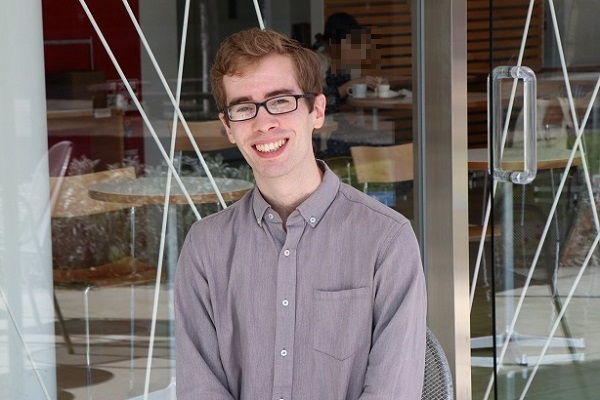
Name: Nicholas Benoit
Home Country: USA
Affiliation: 3rd year PhD Student in the Graduate School of Science (part of the Graduate School of Advanced Science and Engineering since April 2020)
Hobbies: Reading, cooking/baking, traveling locally, and studying music
(Interview Date: October 14, 2021)
Please describe your hometown.
I grew-up in the suburbs of New York City in an area called Rockland County. It is a stereo-typical suburb of America with most people living in houses with lawns and friendly neighbors. Because New York is in the northeast of the United States, it experiences all four seasons, in a similar way as the Tohoku region of Japan. In fact, the clearest memories I have of Rockland County are during the snowfalls in the winter.
After graduating high school, I moved to a very small state called Rhode Island and obtained my undergraduate diploma. After graduating, I got a job in another state called Massachusetts and stayed there for my job. Then after that, I moved here to Hiroshima, Japan. In fact, this October is the beginning of the third and final year of my doctorate program.
What were you doing before entering HU?
I was working for a company full-time as an electrical engineer. In my free time I was a part-time student at the University of Massachusetts, Dartmouth studying for my Physics master’s degree.
Working full-time while in graduate school, how did you manage your time?
Mostly, a lot of planning and scheduling, using my notebook or a calendar. Even now in Japan I have a calendar, which shows where my different times for different things are. I try to always stay on-time for things. When I was working, I would have to leave in the middle of the day to go to school, and then I had to go back to work, to work later into the night. So, I had to be very careful about how much time I spent outside of work and in work. It’s lots of scheduling, I guess.
What was your first impression of HU?
When I came here, I went to Hiroshima Airport, and then there was a bus that brought me to Higashi-Hiroshima Campus. They put me in front of the Student Plaza, and I thought “wow, the campus is much bigger than I imagined!” I thought it was a very pretty campus. It was also while I was standing there that a Japanese student came up to me, and talked to me about joining their club. My impression was, oh, people must be very friendly. It was a very good impression, I think.
It’s very different from the other universities that I have been to. My undergraduate university was next to the ocean, so there were a lot less trees, and there were no mountains. The buildings were smaller. My master’s university is very strange looking. They have all the buildings in a large circle around each other. So, in order to go from one building to the next, you would just walk around in a circle.
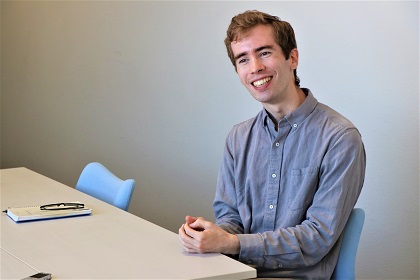
What are you studying now at HU?
I am studying Elementary Particle Physics Theory in the Graduate School of Science. In particular I am interested in a specific elementary particle called the neutrino and the possible new things we could learn about the fundamentals of the universe from it.
How did you become fascinated with neutrinos?
So that happened in my master’s. When I was studying for my master’s, I wanted to find a topic that was interesting, and I read about some things that the neutrino does that sounded strange. There are facts about the neutrino that we know, that are very counterintuitive to our everyday life, and I was very interested in why those facts are true.
So, I started to study more about the neutrino in particular, and I found out that it’s very unique compared to the other types of elementary particles that we know of. There are still many open questions about it. Whereas, we have a very good understanding about most of the other very basic particles. So, I was interested because it seemed to have very strange or interesting properties, and there are still open questions about neutrinos.
There must be many famous neutrino researchers in the world, so why did you choose to study in Japan?
Yes, there are many neutrino researchers in the world, and definitely there are some important experiments for neutrinos that happen in America, for example. Japan is also famous for neutrinos. For instance, there is Prof. Takaaki Kajita of the University of Tokyo, he was awarded the Nobel Prize in Physics 2015 for discovering neutrino oscillations, which show that neutrinos have mass, through his Super-Kamiokande (*) experiments.
The Super-Kamiokande experiment is very famous in the neutrino physics world, it’s a very big experiment in Japan. Recently they have started building a new version called Hyper-Kamiokande.
*) Super-Kamiokande: A large neutrino detector established in Gifu Prefecture, Japan. The observation began in 1996.
On campus, what kind of facilities do you usually use for your research?
So, because my research focuses on theory, it’s very heavy on math. So, my facility on campus for my research is a desk in a room.
Just a desk? How about lab equipment, or chemical agents?
No, I have a computer, and a whiteboard. But otherwise there isn’t much else. There are lots of textbooks, which are very helpful. But I don’t do any physical experiments.
Because my research is closer to mathematics studies. But it’s not the same. There’s a lot more of trying to understand experiments done by other people, and trying to figure out how we can use math to understand those experiments. And we don’t even wear a white coat.
Really?
I think students who do more physical experiments might wear white coats. I sometimes see some people wearing them in the hallway, where there are some different lab groups. I don’t wear a lab coat, but when I worked as an electrical engineer I had to wear a coat.
When and how did you become interested in science?
In science? Science in particular, I don’t know. I know for physics. I took a physics course in high school and there was one experiment we did, and what amazed me was, we used math first to calculate the result of the experiment, and then we did the experiment, and it matched the math we had used. I thought that was very amazing, that you can actually use math to have an understanding of what is happening in the universe and around you.
But even so, I did my undergrad in engineering, which is not physics, so it was a very different field that I went into.
I knew in high school that I didn’t like English and I didn’t like language, so I knew I didn’t want to study those things. The only thing left was math or science. So that’s why I think I prefer science.
I’ve heard that nowadays, there are some Japanese scientists who prefer the research environment in western countries, and leave Japan. Do you feel any big differences between Japan and America in terms of research environment?
I don’t know if I have enough experience in both locations to give a good opinion. Also, I think because I was in America working at a job and doing research, the environment was very different. But I understand that Japanese people have mixed feelings about Japan-born scientists leaving their home country.
I think in terms of culture; Japanese culture is very different from American culture. In America there is a lot more focus on the individual, and a lot more focus on having very strong individual power. While in Japan the focus is more on groups, and having more group power than having individual power. I think both have good impacts. If you are, for example, a very strong individual, maybe the environment in America would be very good for you, because they reward very strong individuals. But that means if you are a normal person, maybe the environment wouldn’t be so good for you.
How about you, are you comfortable in Japan?
Yes, I’m very comfortable.
Do you respect group power, like many Japanese people?
Like Japanese people, I don’t know. There are definitely things that I do that are very American, that are definitely not Japanese. I think I tend to push for things more than other Japanese people in my lab. The other thing is that I’ve been told that my lab group is perhaps not a typical Japanese lab group, that may also play a part.
I don’t think I completely follow Japanese harmony, and there are many things I don’t know about Japanese harmony, so that might be part of my problem, but there are also many things that, because I lived in America for so long, I just do, and then later I learned that oh, that wasn’t the correct or proper way to do those things. Maybe I have more of a mix of the Japanese style and the American style now, which I think I like. I think it might be strange if I changed completely to be like Japanese people.
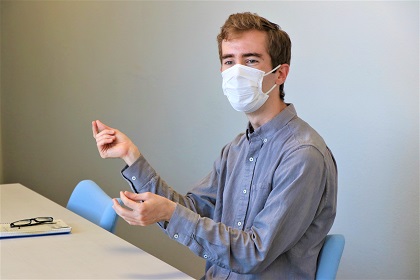
You are working at HU as a research assistant, is it not hard work?
I enjoy it. As a research assistant, my responsibilities involve helping my supervisor with his research work. Helping him with his research work is more like collaboration, trying to work together to solve problems that he is trying to understand. But there are many things that he is trying to understand, so I can only help him with some parts, and then there are different research assistants who help with other parts. So specifically, if there are calculations or something, I can help with those.
Do you go to conferences together?
Yes, but of course nowadays going to a conference just means doing it online. I have never been to an in-person conference since I joined HU, because I was only here for around 3 months and then COVID-19 started. There wasn’t much time.
Yes, it was almost two years ago. How did you feel?
Honestly, I actually felt very safe and not so worried. At that time, and still now, I get information from Japan, but I also get information from America. The information I was getting from America sounded a lot scarier and a lot worse than the information I was getting here, so I felt that it was a much safer place to be, compared to being in America at that time. Of course, I had worries like, if I did get sick, what would I do, how would I go about those things. But there was a lot information given to me, so I was very grateful that they had English versions for many of those things.
What do you enjoy doing when you are not working on your research?
Currently, I have been reading a lot of novels at parks. I enjoy going to different parks and finding a nice place to sit-down and read. It helps me to calm down and decompress. I also enjoy cooking/baking, traveling locally, and studying music.
You enjoy cooking. Are you just trying for yourself? Or are you making someone eat your cooking?
Only myself, really. I guess making for someone else would be very dangerous.
Why? I think you must be good at these things, since it’s like an experiment, if you follow the recipe strictly, you will have great results.
I find some of the recipe instructions to be very vague. Meaning, they will say, cook the food until it turns a nice light brown. “Nice?” So, I wonder, is now a nice light brown? Or do I need to wait another minute? Understanding some of those instructions sometimes makes me very confused. But also, I enjoy experimenting with food. So, I don’t often follow recipes, which is maybe also the problem.
I see. By the way, how do you feel about Japanese kitchen size?
In my first apartment, the only thing I had was one gas burner. So, compared to my American apartment, which had a full range oven with 4 gas burners, there was basically nothing. So, it is very impressive to me that Japanese can cook so many different types of food with only that.
The other thing that is strange is that the oven and the microwave oven is the same thing. In America they are very separate.
You said earlier that this year will be the final year of your doctoral course. Is there anything you think you will miss from Japan if you go back to the US one day?
That is a good question. I think yes, there would definitely be things that I would miss, but I don’t know exactly what I would miss. The reason that I really have enjoyed living in Japan, is because of the difference in how society works compared to America, so maybe there are societal things that I would miss.
Living near New York, there are many things that have come from Japan to America. For example, it is very easy to get sushi in New York, so I can’t say that that is something I would miss. Definitely there are societal things that I do like and would miss, having lived here.
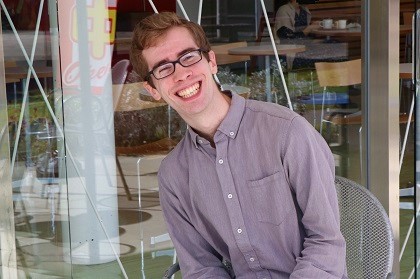
What is your dream for the future?
My future dream may be kind of expected, it is to be a good scientist. I want to contribute positively to the world, and I think the best way for me to do that is by being a good scientist. To this end, for example, I attend webinars aimed at teaching young researchers how to approach a career in science. I also try to attend any online workshop that is related to my studies.
Tell us, in your opinion, what makes a “good scientist”?
That’s a good question, in my mind a good scientist is someone who has the ability to do research that can have good benefits on society, and someone who isn’t only trying to write papers and only trying to get a lot of funding. I think that can be very dangerous.
I believe someone who is a good scientist has more focus on having good research skills that can help benefit society in the long-term. So, I guess I want to be a person who is good at research and who can be helpful to society as a whole. I hope that I can avoid getting caught in the idea of “oh I must write a paper because I didn’t write 5 papers this year” and those kinds of goals. I think that’s what being a “good scientist” means to me.
Photo Gallery
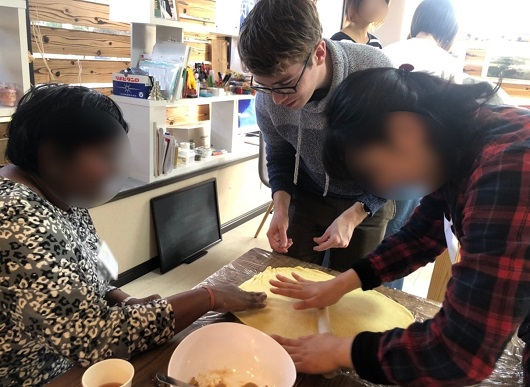
Learning to make cinnamon rolls in a frying pan before the start of COVID-19
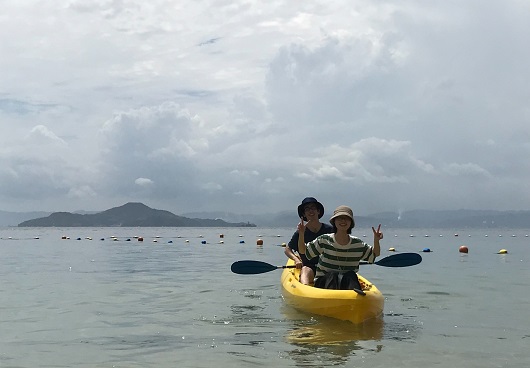
Learning about the Seto Inland Sea on the island of Etajima in Hiroshima and making friends.
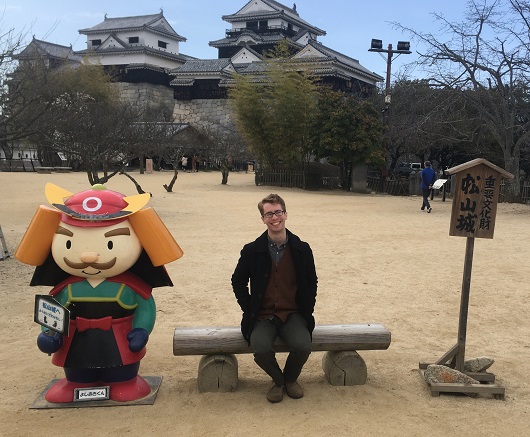
Short adventure across the Seto Inland Sea to Matsuyama City (Ehime Prefecture) to see Matsuyama Castle and Dogo Onsen.
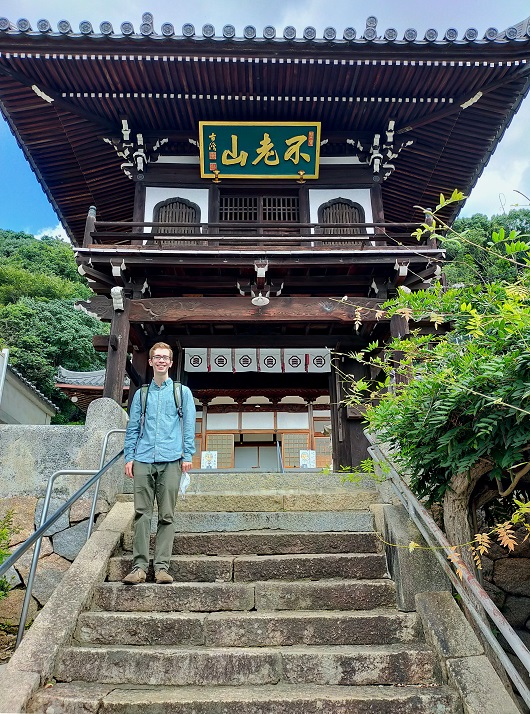
Short adventure inside Hiroshima Prefecture to Takehara City to see the historic district.
Upon thorough implementation of infection prevention measures, masks are sometimes removed during interviews for the purpose of taking photographs.


 Home
Home